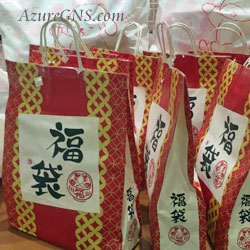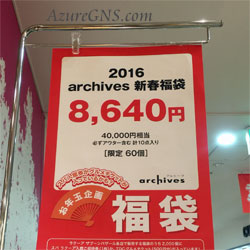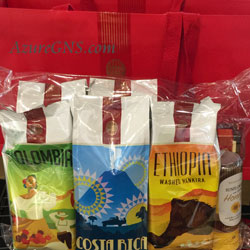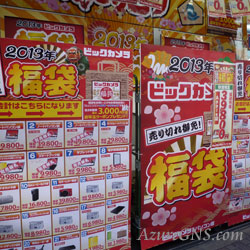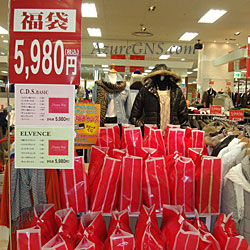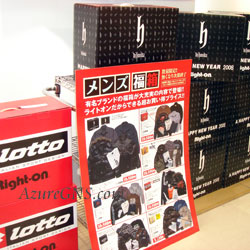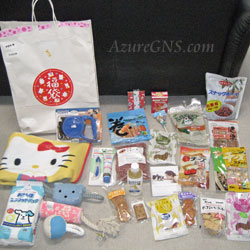(1月初旬)
Fuku-bukuro;
Lucky Bags
(The Beginning of January)
●福袋 fuku-bukuro; lucky-bag; happy-bag; mystery-bag
●お年玉袋 otoshidama-bukuro
●正月;新年 the New Year
●元旦 New Year’s Day
●初売り hatsu-uri; the first sale of the New Year
●新春セール New Year sale
●百貨店 department store
●ショッピングセンター shopping mall
●スーパーマーケット supermarket
●商品 product
◆新年の初売りの日は多くの百貨店にとって1年で最も売り上げが多くなる日です。
On the day of the first sale of the New Year, many department stores experience their highest sales of the year.
◆元旦か2日の早朝、中には前夜より多くの人が日本中のデパートの入り口で列を作って、今か今かと開店を待ちます。
Early in the morning of New Year’s Day or January 2nd, many people, some from the previous night, line up in front of the entrances of the department stores all over Japan and wait for the opening hours.
◆そして開店と同時にお客さん達は店内になだれ込み、お目当ての個数制限のある福袋を手に入れるために熱い闘いを繰り広げます。
As soon as the stores open, people desperately rush into the stores and take aim to get fuku-bukuro which are in limited quantity.
◆福袋は販売価格以上の値打ちのある商品を通常複数個、紙袋や不透明なビニール袋などに入れ、中身が分からないように封をして売られています。
The fuku-bukuro (“fuku” means lucky, and “bukuro” means a bag) is sold in a paper bag or an opaque plastic bag which contains, usually multiple, commercial products worth more than the selling price of the bag and is sealed in order to keep the contents from sight.
◆しかし最近では安いだけではなく、自分の好きな商品が入っていないと売れないし、少々高くても本当に欲しいものは買う時代になったので、伝統とは異なり、中身が分かるように透明な袋に入れられていたり、事前に商品が発表されたりします。
However, apart from the traditional kinds, transparent varieties show the contained products or products in the bags are released in advance because customers today don’t buy unnecessary products no matter how cheap; on the contrary, they buy what they really want in spite of it being at a slightly higher price.
◆戦後しばらくの間までは、福袋の商品は在庫処分品がほとんどでしたが、現在では普段デパートや店舗に来ないお客さんが足を運ぶきっかけになり、リピーターになってもらうために、質の良い商品がお得な価格で提供されるようになりました。
For some time after World War ll, most of the products in the bag were inventory clearance goods, but nowadays high-quality products are offered at low prices, so that those who rarely come to department stores will come back again.
◆本来は福袋に入らないような商品を福袋と称して販売することもあり、家電製品、着物、車、ホテルの宿泊券、豪華旅行券、そして1億円近くの住宅の福袋が売れたまれな例があります。
Products unsuitable for the fuku-bukuro are sometimes sold; for example, household electric appliances, kimono (Japanese traditional costume) and coupons of hotels or luxury travel, and moreover, there was a very rare case where the 100-million-yen fuku-bukuro containing the coupon for a house was sold.
◆これらのケースのように本来の福袋の概念とかけ離れ、話題性を狙った福袋という名前を使った新春の販売形式である場合も多々見られます。
Some cases, as mentioned above, are far from the original concept of the fuku-bukuro and just the New Year style of selling under the name of the fuku-bukuro, aiming to draw public attention.
◆福袋の為にお客さんが長時間並ぶ必要がないように、整理券が配られたり、予約できたり、ネット通販で購入できるなどさまざまな工夫がされています。
To avoid a long queuing time for the bags, various improvements have been made such as the issue of numbered tickets, reservations and internet trading.
◆福袋は江戸時代に日本橋の越後屋(現在の三越百貨店)が裁ち余りの生地を袋に入れ、えびす講で安く売ったのが評判になり、各地に広まったのがその始まりと言われています。
The origin of the fuku-bukuro dates back to the Edo period: Echigo-ya (the present Mitsukoshi Department Store) in Nihonbashi Town sold scraps of kimono cloth in bags at Ebisu-ko (the Ebisu Festival) and it became popular and spread all over Japan.
◆福袋に入っていた不要な商品を店舗周辺で物々交換する光景がよく見られていましたが、最近はインターネットのフリーマーケットサイトやオークションサイトで転売する人が増えました。
Unnecessary items in the fuku-bukuro were often bartered around the shops before; however, they are now more likely to be resold on the internet free market site or auction site.
(より詳しい情報は「我が家の福袋」をご覧下さい。)
(Please see “Our Fuku-bukuro Experience” for further information.)
Copyright (C) Azure Global Network Services. All Rights Reserved.
